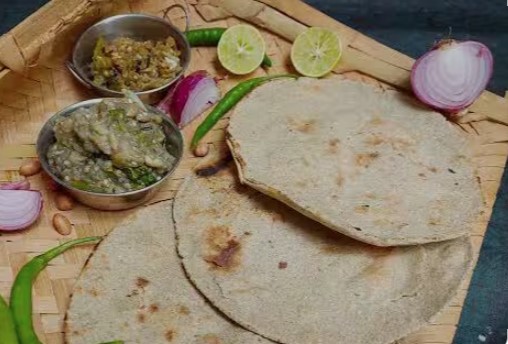“Stop this vomiting,” she said firmly, her voice steady enough to make even the nurse stop fidgeting with the clipboard. “Ease the pain a little. Once I gather some strength, I’ll take you to my village. You’ll sit on the mud floor, eating from banana leaves. Hot jowar bhakris, fresh off the chullah, with just enough ghee to make your fingers shine.”
She paused, as though the thought alone gave her strength. “And have you tried pithale? Pair it with mango pickle. Or fresh green onions straight from the field? You’ll lick your fingers clean,” she added with the faintest hint of mischief.
We—an assembly of doctors and nurses—stood around her bed, captivated. Unlike most cancer patients, she inspired awe. “But first,” she said, leaning back against her pillow, “let me get better.”
She wasn’t just another patient in the palliative ward. She had the air of someone used to giving instructions and seeing them followed—be it her children, the women in her village, or now, the doctors and nurses hovering around her, unsure whether to laugh or prescribe medicines.
Her cheeks were full, her posture stubborn. But the colostomy bag at her waist hinted at a silent betrayal. Cancer had taken her cervix and colon and was now eyeing the rest of her.
“I’ve endured it all,” she said with an almost dismissive shrug. “Chemo, radiation, the medicines that make your veins burn.” She looked at us with a flicker of defiance. “I didn’t give up, not even when the pain made me think, ‘This is it.’ But it wasn’t.”
We shifted uncomfortably. Someone asked softly, “What kept you going?”
She smiled, leaning forward as if sharing a secret. “Hope,” she said, then added, “and food.”
The doctor closest to her raised an eyebrow. “Food?”
She laughed, a full, generous laugh that silenced the monitors and machines. “Food, yes. I worked all my life as an Anganwadi worker. I fed children, vaccinated them, taught mothers how to take care of their families. Life was full. I was full. Then I came to this city with its damp monsoon. My son brought me here, and I became lazy. No work, no firewood to gather, no bhakris to pat into shape. My guard dropped, and the cancer returned.”
Her gaze drifted to the window. “I miss my village. I miss my chullah. Those bhakris—I’d gather firewood, knead the dough, shape them with my hands, and watch them puff on the tawa. Their warmth, their aroma—that was my joy.”
“I’d char brinjals until their skin blistered and their flesh turned smoky and tender. Then I’d mash them with onions, green chilies, coriander, and mustard oil. That’s bharit—smoky, spicy, perfect with bhakris.”
Her smile returned, fiercer now. “Just give me strength. Let me shame the cooks in five-star hotels. They don’t know what real food is.”
We laughed, though her words were no jest. For her, food was life—a purpose, a ritual of defiance.
The bharit, the bhakris, the chullah, her village—these were not just memories. They were her resistance, her resilience, her reason to endure.
As we walked away, her words lingered, like the smoky scent of firewood.
